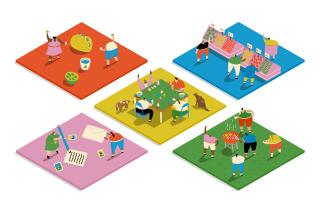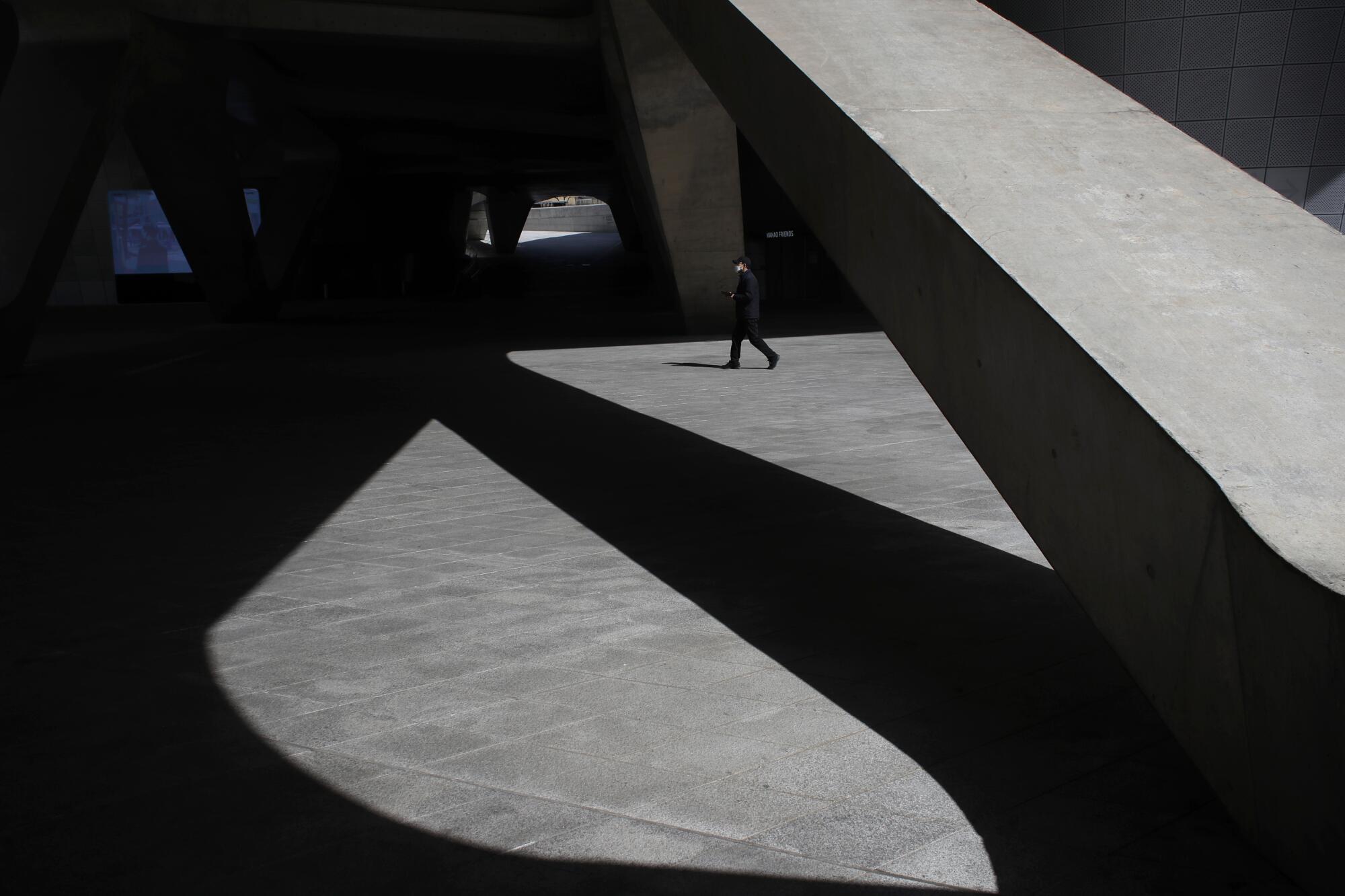
- Share via
SEOUL — Before dawn, bags of groceries ordered online are plopped at my front door by deliverymen (-women?) whose faces I’ll never see.
I summon taxis on my smartphone, rendering unnecessary even the brief conversation to give the driver my destination or discuss an optimal route. All manners of food — from steaming stews to sushi to the seemingly most ephemeral of dishes, shaved ice — can be ordered for delivery within the hour. If I so choose, I can avoid even a split-second of face time by requesting, in an app, that the food be left outside my door.
In Seoul, one of the most densely packed metropolises in the world, I can glide through a day dining out, shopping and even singing karaoke on my own without ever interfacing with another human. My world is one of apps, tablets and self-service screens. It’s almost as if the city was girding itself for this moment in history, when each and every face-to-face interaction has come to feel like a game of Russian roulette.
Long before the virus’ arrival, social distancing was becoming a way of life in my native South Korea, as it was around a globe increasingly accustomed to same-day shipping, on-demand service apps and more streamed entertainment than one could watch in a lifetime. The precision and convenience of drop-down menus and electronic payments has taken the place of in-person transactions; the allure of algorithm-optimized content and infinitely replenishing social media has come to trump the less sure bet of flesh-and-blood company.
The coronavirus, in forcing a swath of humanity to shelter in place for weeks on end, may very well accelerate that digital sequestration and seal us more deeply in the glow of our screen-enabled confines.
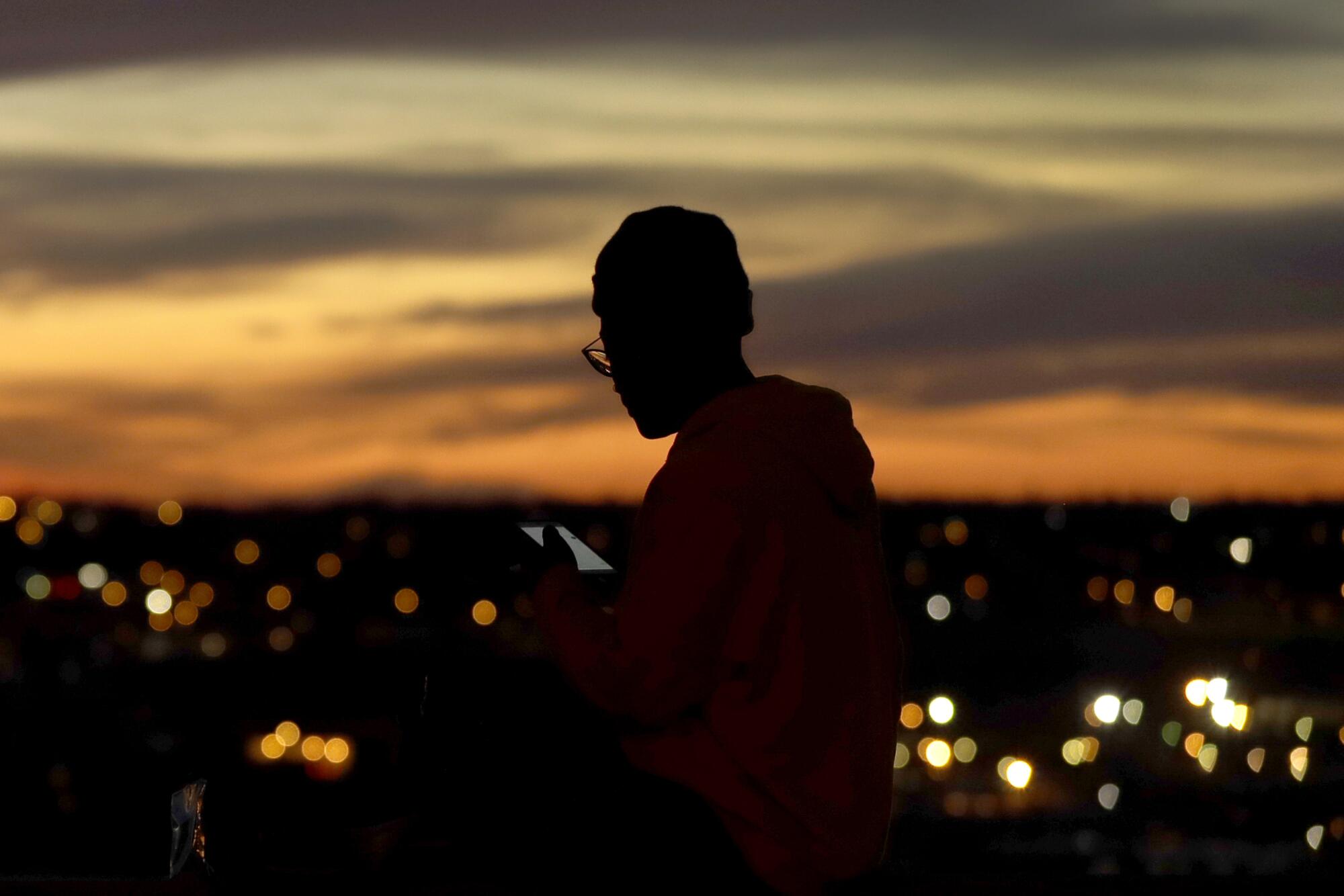
It’s a grand social experiment of an unprecedented scale. When we emerge from weeks or months of distancing from one another, will we crave and relish human contact, or realize how comfortably we can live without it? What will that do to us?
“I think this will become the new normal,” said Koo Bon-kwon, a South Korean columnist and author who writes about how technology has changed human lives. “A chunk of our society will experience this for the first time and realize, there isn’t a whole lot of difference to workflow, productivity and performance.”
It’s long been the paradox of urban living that the closer we’re packed together, the more anonymous and alienated we become. The novel coronavirus has added to even the most fleeting of interactions a sense of peril, changing the risk-benefit calculus of the minute, mundane human encounters that thread our daily lives. Will that exchange with the store clerk, that brush on the subway, that elevator ride be the fateful moment the invisible virus makes its entry?
The shelter-in-place and six-feet social distancing measures unfolding across the U.S. have left many anxious about the indefinite period of isolation ahead. News reports are asking everyone from astronauts to inmates in long-term solitary confinement for tips on how to persevere.
But nestled in front of our TV screens and scrolling through our smartphones, weren’t we increasingly living that way already?
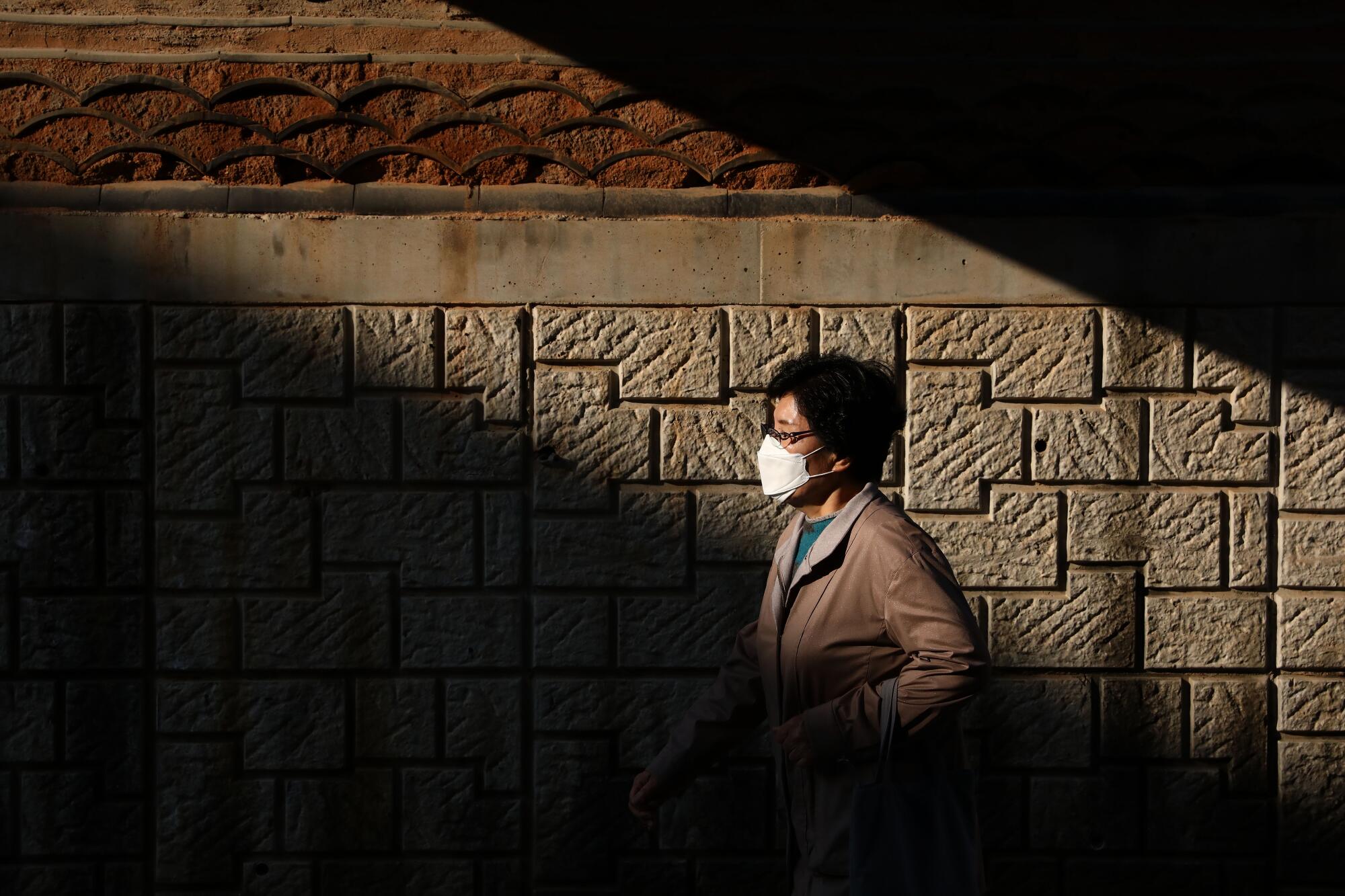
Isolation has for years been both a cultural trend and marketing buzzword in South Korea and elsewhere in East Asia. The once-robust family ties in these societies are fraying. Rapid urbanization and cut-throat economic competition have left a generation fatigued by interacting with fellow denizens. In Japan, “low-interaction dining” for lone diners, facilitated by automated ticketing machines and cubicle-like partitions, had long since become a fixture of city life. In China, consultants in recent years published reports on the “Economy of Loneliness,” extolling business opportunities to cater to a generation more comfortable spending time alone than in the company of others.
In South Korea, increasing numbers of young adults had been self-identifying as “honjok” — loosely translated to “tribe of loners,” people who prefer solitude. Businesses realized more and more people preferred services devoid of human contact, and would even pay a premium for it. They began offering up what’s come to be known here as “untact” services, a neologism combining “undo” and “contact,” popularizing self-service auto financing, coffee served up by robot-arm baristas and unmanned, self-pay karaoke stalls.
In the U.S. and Europe, there’s been increasing alarm about the health consequences of loneliness, researchers calling loneliness itself an “epidemic.” But in Asia, time alone for some has come to be celebrated and cherished as a revolt against a collectivist tradition and something of a liberation for a generation of young adults.
“I think this will become the new normal.”
— Koo Bon-kwon, columnist and author
Jeong Dan-bi, 31, runs a start-up providing information and services for the honjok — such as cocktail recipes to make at home, and where to get shabu shabu for one. She said the “loner” phenomenon was about prioritizing one’s own time and preference in defiance of a rigid corporate and working culture that limits individual expression.
“We were probably able to accept [social distancing] more easily because that culture was already spreading, especially among millennials,” said Jeong, 31, chief executive of the company King of Honjok.
Since the coronavirus outbreak, there’s been a twofold surge in sign-ups for her app, Jeong said. She noted in South Korea, there had been negative views of the trend from the older generation casting it as youthful selfishness, but that may shift with the coronavirus outbreak.
“A monumental event like this will really change people’s perceptions,” she said. “People across generations were forced to experience it. There are going to be people who think, now that I’ve tried it out, I like it.”
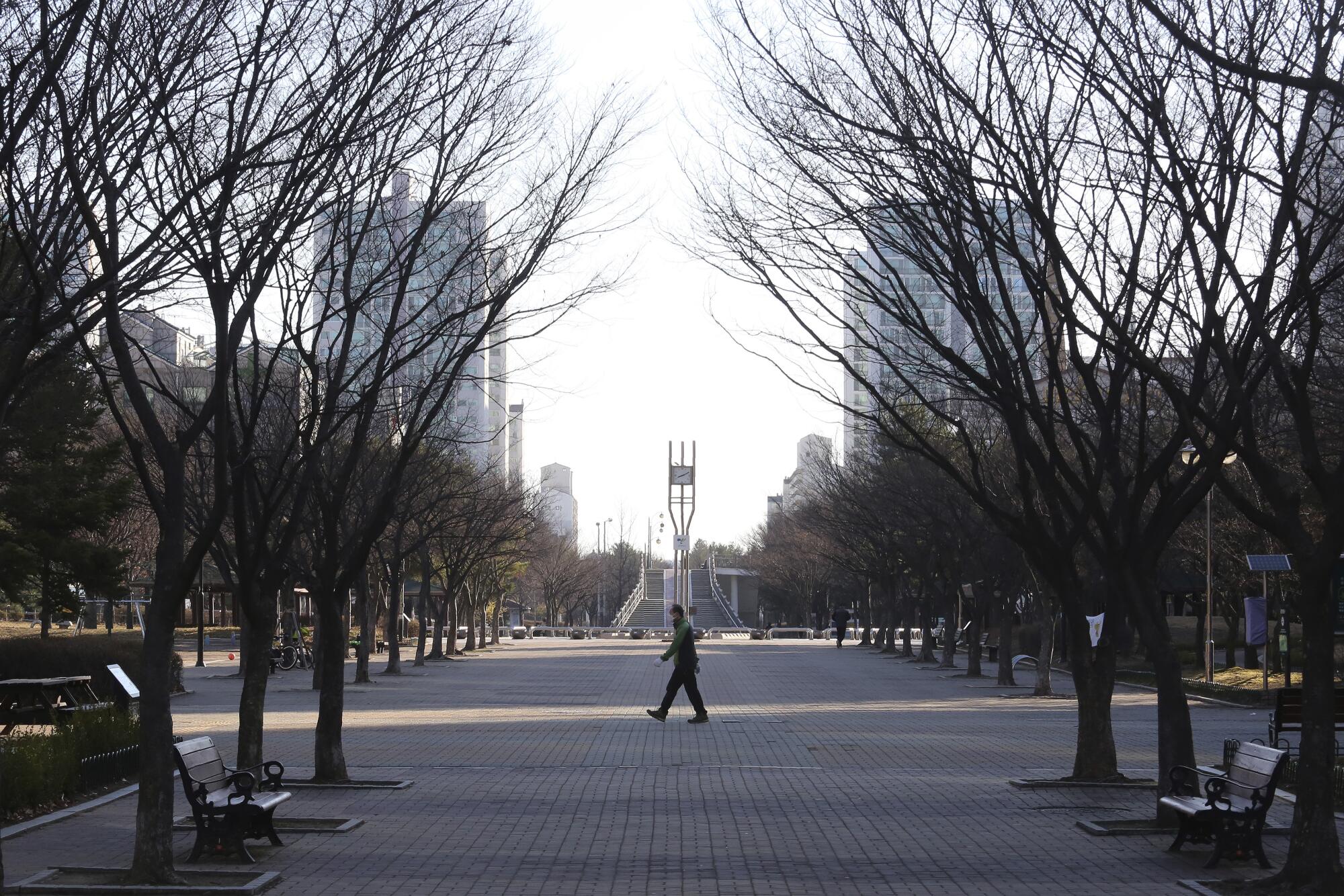
Despite an early surge of coronavirus infections in February — with the largest number of infected outside China at one point — South Korea never imposed mandatory business closures or large-scale quarantines. Instead it urged citizens to voluntarily socially distance for two weeks. Combined with extensive contact tracing and widespread testing, the approach appeared to stabilize the community spread, the number of new infections leveling off in recent weeks.
A newspaper op-ed last week credited South Korea’s legions of deliverymen and -women as the unsung heroes who had allowed life in the country to largely go on even as cities elsewhere went on lockdown. Amid a surge in orders, a deliveryman in his 40s with a heart condition collapsed and died on the job in the early hours of March 12.
“It is not an exaggeration to say, doctors are on the front lines fighting the coronavirus and protecting our lives, while in the rear, deliverymen are protecting people struggling to keep their distance from the virus,” an op-ed in the Joongang Ilbo newspaper said.
While the possibility of a second wave of cases from travelers and students returning from abroad still remains, Seoul is in a thaw. In time for the spring bloom, Jeong’s office reopened after about two weeks of telecommuting. Koo, the columnist, who writes for the Hankyoreh newspaper, has begun setting up the occasional lunch appointment after about a month of little contact with anyone outside his immediate family.
“The world has changed. It could easily have been very depressing and anxiety-inducing, but even in self-quarantine we were connected through the mobile web,” said Koo, who is 54 and identifies as a product of a pre-digital world. “We were cut off but not cut off at the same time, connected all the more intimately.”
Koo, though, said he believed there were things that would never be replaced with an app or a screen.
“There is an emptiness that comes from not being able to see someone’s facial expression, feel their warmth and share a moment of kinship,” he said.
More to Read
Sign up for Essential California
The most important California stories and recommendations in your inbox every morning.
You may occasionally receive promotional content from the Los Angeles Times.

